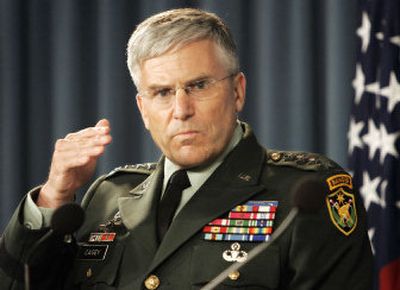U.S. will continue paying to publish

WASHINGTON – The U.S. military plans to continue paying Iraqi newspapers to publish stories favorable to the United States after an inquiry found no fault with the controversial practice, the top U.S. general in Iraq said Friday.
Army Gen. George W. Casey said that the review has concluded that the U.S. military has not violated any American laws or Pentagon guidelines by running the information operations campaign in which U.S. troops and a private contractor called Lincoln Group write pro-American stories and pay to have them planted without attribution in the Iraqi media.
“By and large, it found that we were operating within our authorities and responsibilities,” Casey said, adding that he has no intention of shutting the program down.
The information program has been heavily criticized both inside and outside of the military as detrimental to U.S. credibility and contrary to the principles of a free press in a nascent, embattled democracy.
During his briefing with reporters, Casey also addressed conditions in Iraq, saying that commanders believe that the violence brought on by last week’s bombing of a venerated Shiite mosque in Samarra has largely subsided, and that Iraq has moved away from the brink of large-scale civil war.
“Has there been violence and terrorism here in Iraq in the wake of the Samarra bombings? Clearly. Is the violence out of control? Clearly not. Now, it appears that the crisis has passed,” Casey said.
While the final report by Navy Adm. Scott Van Buskirk is not yet complete, Casey’s comments are the clearest sign that the U.S. military sees the propaganda effort as a critical tool for winning hearts and minds in Iraq. Van Buskirk’s report could pave the way for the Pentagon to duplicate the practice – which would be illegal for the military in the United States – in other parts of the world.
Casey’s comments, made during a video teleconference with Pentagon reporters, also highlighted the split in attitude on the program between military commanders in Baghdad and some senior officials in Washington. After the existence of the Lincoln Group program was revealed in an article in the Los Angeles Times three months ago, White House officials said they were “very concerned” about the practice of paying Iraqi newspapers to publish unattributed stories written by American troops.